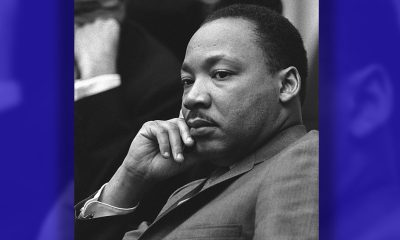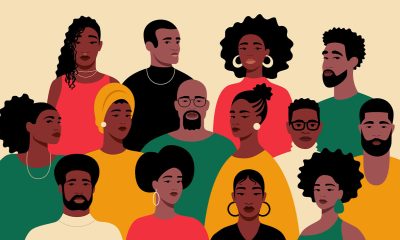#NNPA BlackPress
University of Memphis sit-in commemoration looks back and forward
NNPA NEWSWIRE — On April 23, 1969, 75 BSA members at the University of Memphis staged a sit-in at then-President Cecil Humphreys’ office because he refused to provide $1,750 to bring U.S. Rep. Adam Clayton Powell Jr., the first black person to be elected from New York to Congress, to speak to the association.
By Harlan McCarthy, Special to The New Tri-State Defender
Fifty years ago, Carolyn Goodwin-Willett was a young, scared student thrust into the spotlight as a student activist at then-Memphis State University. Now? Goodwin-Willett is proud of her actions as a Black Student Association member that eventually brought about change to what is now the University of Memphis.

Carolyn Goodwin-Willett, David Acey Sr. and James De’Ke Pope shared reflections during a panel discussion moderated by author Shirletta Kinchen (not pictured). (Photo: Tyrone P. Easley)
“I had the opportunity to come back to this campus in 2004 and work on my master’s. Totally different experience from when I was here in 1966. I was a scared student. I was 17 years old and you were going into classrooms where the entire class would look to the other side of the room and you were the only black student in there.
“It was scary. We didn’t have a lot of choices. Most of us were first generation for our family and they were dependent on us.”
Goodwin-Willett and her fellow BSA members from that time were the subject of a April 12 panel discussion on campus that was moderated by Shirletta Kinchen, author of “Black Power in the Bluff City: African American Youth and Student Activism in Memphis,” which is centered around the Black Student Association sit-in and other historical events in Memphis.
“If not for this book or chapter (1969 sit-in chapter of the book), I’m not sure we would understand the accentuality of that experience of history,” said Aram Goudsouzian, chair of UM’s history department.
On April 23, 1969, 75 BSA members at the University of Memphis staged a sit-in at then-President Cecil Humphreys’ office because he refused to provide $1,750 to bring U.S. Rep. Adam Clayton Powell Jr., the first black person to be elected from New York to Congress, to speak to the association.
After the first sit-in, BSA garnered support from the Memphis chapter of the National Association for the Advancement of Colored People (NAACP) and the Community on the Move for Equality (COME). COME had been active in supporting the 1,300 sanitation strikers the year before.

This plaque, unveiled at the University of Memphis administration building on April 12, commemorates the 1969 sit-in protest that prompted 109 arrests. (Photos: Tyrone P. Easley)
Describing his experience at that time, David Acey, the first president of the BSA, said, “I came here in 1965 and it was terrible. My first semester, there were less than 100 students here. We had no participation in any of the social activity here or anything on campus, no football players, no teachers, no workers in the library.”
With help from the outside organizations, the students would stage a second sit-in on April 28, 1969. Similar to the last protest, police were called. This time the students refused to leave and all 109 were charged and jailed. While the charges were eventually dismissed, blacks continued to demand integration upon campus life.
Despite her undergraduate experience being one of fear, Goodwin-Willett said when she looks back, she’s happy for diversity and inclusion that the BSA created.
“I look at the doors we opened when we came here. We opened doors to have a BSA. We opened doors and had the first black professor here. Not only did we open the doors for the black professor but when she came, she held the door open.”
James De’Ke Pope, the second president of BSA, said BSA also helped those in the community voicing their concerns.
“I wanted to establish a relationship with high school students, especially those that mentioned they were interested in Memphis State. We started a summer school for those coming in and had book exchanges.”
In closing the panel discussion, Harry T. Cash III, assistant director of multicultural affairs and Kevyanna Rawls, president of Student Government Association, reflected on the long-lasting impact and influence of the former BSA members.
Cash recognized the members of the sit-in and blacks who have made contributions to the university community. Rawls cited the roles that have been filled by black students on the campus today and encouraged students to continue to fill those rolls.
Black Power in the Bluff City: African American Youth and Student Activism in Memphis can be purchased on Amazon.
#NNPA BlackPress
Remembering George Floyd
#NNPA BlackPress
OP-ED: Oregon Bill Threatens the Future of Black Owned Newspapers and Community Journalism
BLACKPRESSUSA NEWSWIRE — Nearly half of Oregon’s media outlets are now owned by national conglomerates with no lasting investment in local communities. According to an OPB analysis, Oregon has lost more than 90 news jobs (and counting) in the past five years. These were reporters, editors and photographers covering school boards, investigating corruption and telling community stories, until their jobs were cut by out-of-state corporations.

By Dr. Benjamin F. Chavis, Jr.
President and CEO, National Newspaper Publishers Association
For decades, The Skanner newspaper in Portland, the Portland Observer, and the Portland Medium have served Portland, Oregon’s Black community and others with a vital purpose: to inform, uplift and empower. But legislation now moving through the Oregon Legislature threatens these community news institutions—and others like them.
As President and CEO of the National Newspaper Publishers Association (NNPA), which represents more than 255 Black-owned media outlets across the United States—including historic publications like The Skanner, Portland Observer, and the Portland Medium—l believe that some Oregon lawmakers would do more harm than good for local journalism and community-owned publications they are hoping to protect.
Oregon Senate Bill 686 would require large digital platforms such as Google and Meta to pay for linking to news content. The goal is to bring desperately needed support to local newsrooms. However, the approach, while well-intentioned, puts smaller, community-based publications at a future severe financial risk.
We need to ask – will these payments paid by tech companies benefit the journalists and outlets that need them most? Nearly half of Oregon’s media outlets are now owned by national conglomerates with no lasting investment in local communities. According to an OPB analysis, Oregon has lost more than 90 news jobs (and counting) in the past five years. These were reporters, editors, and photographers covering school boards, investigating corruption, and telling community stories, until their jobs were cut by out-of-state corporations.
Legislation that sends money to these national conglomerate owners—without the right safeguards to protect independent and community-based outlets—rewards the forces that caused this inequitable crisis in the first place. A just and inclusive policy must guarantee that support flows to the front lines of local journalism and not to the boardrooms of large national media corporations.
The Black Press exists to fill in the gaps left by larger newsrooms. Our reporters are trusted messengers. Our outlets serve as forums for civic engagement, accountability and cultural pride. We also increasingly rely on our digital platforms to reach our audiences, especially younger generations—where they are.
We are fervently asking Oregon lawmakers to take a step back and engage in meaningful dialogue with those most affected: community publishers, small and independent outlets and the readers we serve. The Skanner, The Portland Observer, and The Portland Medium do not have national corporate parents or large investors. And they, like many smaller, community-trusted outlets, rely on traffic from search engines and social media to boost advertising revenue, drive subscriptions, and raise awareness.
Let’s work together to build a better future for Black-owned newspapers and community journalism that is fair, local,l and representative of all Oregonians.
Dr. Benjamin F. Chavis Jr., President & CEO, National Newspaper Publishers Association
#NNPA BlackPress
Hate and Chaos Rise in Trump’s America
BLACKPRESSUSA NEWSWIRE — Tactics ranged from local policy manipulation to threats of violence. The SPLC documented bomb threats at 60 polling places in Georgia, traced to Russian email domains.

By Stacy M. Brown
Black Press USA Senior National Correspondent
The Southern Poverty Law Center has identified 1,371 hate and antigovernment extremist groups operating across the United States in 2024. In its latest Year in Hate & Extremism report, the SPLC reveals how these groups are embedding themselves in politics and policymaking while targeting marginalized communities through intimidation, disinformation, and violence. “Extremists at all levels of government are using cruelty, chaos, and constant attacks on communities and our democracy to make us feel powerless,” said SPLC President Margaret Huang. The report outlines how hard-right groups aggressively targeted diversity, equity, and inclusion (DEI) initiatives throughout 2024. Figures on the far right falsely framed DEI as a threat to white Americans, with some branding it a form of “white genocide.” After the collapse of Baltimore’s Francis Scott Key Bridge, a former Utah legislator blamed the incident on DEI, posting “DEI = DIE.”
Tactics ranged from local policy manipulation to threats of violence. The SPLC documented bomb threats at 60 polling places in Georgia, traced to Russian email domains. Similar threats hit Jewish institutions and Planet Fitness locations after far-right social media accounts attacked them for trans-inclusive policies. Telegram, which SPLC describes as a hub for hate groups, helped extremists cross-recruit between neo-Nazi, QAnon, and white nationalist spaces. The platform’s lax moderation allowed groups like the Terrorgram Collective—designated terrorists by the U.S. State Department—to thrive. Militia movements were also reorganized, with 50 groups documented in 2024. Many, calling themselves “minutemen,” trained in paramilitary tactics while lobbying local governments for official recognition. These groups shared personnel and ideology with white nationalist organizations.
The manosphere continued to radicalize boys and young men. The Fresh & Fit podcast, now listed as a hate group, promoted misogyny while mocking and attacking Black women. Manosphere influencers used social media algorithms to drive youth toward male-supremacy content. Turning Point USA played a key role in pushing white nationalist rhetoric into mainstream politics. Its leader Charlie Kirk claimed native-born Americans are being replaced by immigrants, while the group advised on Project 2025 and organized Trump campaign events. “We know that these groups build their power by threatening violence, capturing political parties and government, and infesting the mainstream discourse with conspiracy theories,” said Rachel Carroll Rivas, interim director of the SPLC’s Intelligence Project. “By exposing the players, tactics, and code words of the hard right, we hope to dismantle their mythology and inspire people to fight back.”
Click here for the full report or visit http://www.splcenter.org/resources/guides/year-hate-extremism-2024.
-

 Activism4 weeks ago
Activism4 weeks agoAI Is Reshaping Black Healthcare: Promise, Peril, and the Push for Improved Results in California
-

 Activism4 weeks ago
Activism4 weeks agoBarbara Lee Accepts Victory With “Responsibility, Humility and Love”
-

 Activism4 weeks ago
Activism4 weeks agoESSAY: Technology and Medicine, a Primary Care Point of View
-

 Activism4 weeks ago
Activism4 weeks agoFaces Around the Bay: Author Karen Lewis Took the ‘Detour to Straight Street’
-

 Arts and Culture4 weeks ago
Arts and Culture4 weeks agoBOOK REVIEW: Love, Rita: An American Story of Sisterhood, Joy, Loss, and Legacy
-

 Activism4 weeks ago
Activism4 weeks agoNewsom Fights Back as AmeriCorps Shutdown Threatens Vital Services in Black Communities
-

 #NNPA BlackPress4 weeks ago
#NNPA BlackPress4 weeks agoThe RESISTANCE – FREEDOM NOW
-

 Activism4 weeks ago
Activism4 weeks agoTeachers’ Union Thanks Supt. Johnson-Trammell for Service to Schools and Community





















































